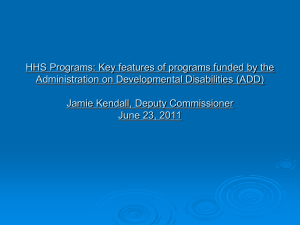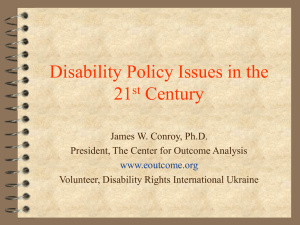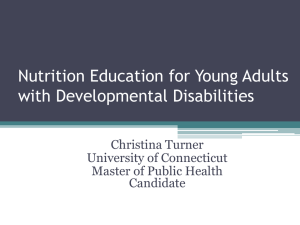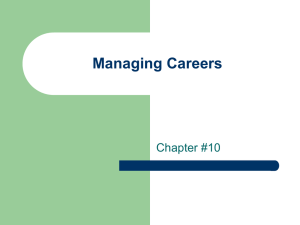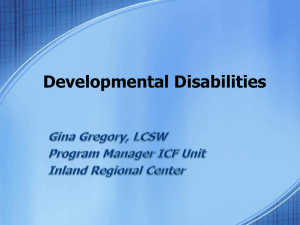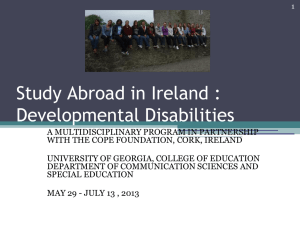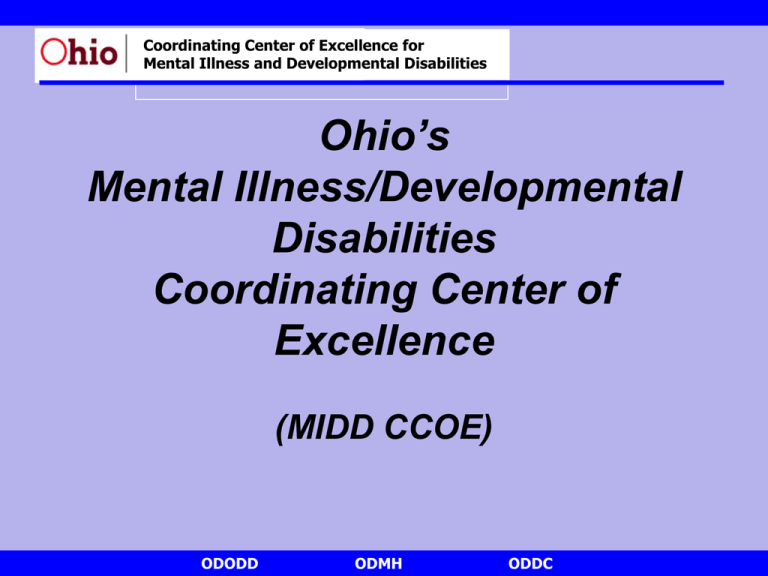
Coordinating Center of Excellence for
Mental Illness and Developmental Disabilities
Ohio’s
Mental Illness/Developmental
Disabilities
Coordinating Center of
Excellence
(MIDD CCOE)
ODODD
ODMH
ODDC
Coordinating Center of Excellence for
Mental Illness and Developmental Disabilities
Incidence
There are an estimated 30,000 individuals
in Ohio who would qualify at any given
time as being dually diagnosed with
developmental disabilities and mental
illness.
ODODD
ODMH
ODDC
Coordinating Center of Excellence for
Mental Illness and Developmental Disabilities
Incidence, Cont’d.
• Approximately 34% of individuals with
developmental disabilities served in the
community have dual diagnoses*
• Approximately 71% of individuals with DD
in institutional settings have dual
diagnoses.
*National Core Indicators, 2008-2009
ODODD
ODMH
ODDC
Coordinating Center of Excellence for
Mental Illness and Developmental Disabilities
Trauma-Informed Care: A Universal
Precaution
It is estimated that an overwhelming percentage
of the population has suffered “adverse events”
that can be considered traumatic (SAMSHA,
2011). People with developmental disabilities
are at greater risk of victimization. Also, smaller,
“everyday” adverse events and losses can
overwhelm coping skills, resulting in cumulative
traumatic effects. Given this, it makes sense to
consider safety and control (the main issues
ODODD
ODMH
ODDC
Coordinating Center of Excellence for
Mental Illness and Developmental Disabilities
of people suffering the aftereffects of
trauma), for everyone you treat. In this
way you can offer elements of traumainformed care without missing someone
who’s trauma history has gone unreported.
If an individual does NOT have a
significant trauma history, making sure
they feel safe and in control will not hurt.
Consider trauma-informed care the
“universal precaution” for this population.
ODODD
ODMH
ODDC
Coordinating Center of Excellence for
Mental Illness and Developmental Disabilities
Our Philosophy
•
Mental health can work with people with DD. In most cases they
already have the tools, and just need some specific modifications. DD
can work with people with mental illness. In most cases they already
have the tools, and just need some specific modifications.
•
In both systems, the way to begin working with people with dual
diagnoses is with the universal precaution of trauma-informed care:
making sure each individual feels safe and in control.
•
To address the gaps in what each system can do, we must collaborate
with each other.
•
The MIDD CCOE can help with all three of the above points.
ODODD
ODMH
ODDC
Coordinating Center of Excellence for
Mental Illness and Developmental Disabilities
Our Mission
The mission of the MIDD CCOE is to make life
better for people who are diagnosed with both mental illness and
developmental disabilities. The MIDD CCOE
•
funds expert psychiatric diagnostic assessments
•
sponsors and supports local/county trainings and conferences
•
encourages county MH and DD systems to talk to each other and train
their staff to improve their work together
•
helps colleges, universities and professional schools include dual
diagnosis in their programs
ODODD
ODMH
ODDC
Coordinating Center of Excellence for
Mental Illness and Developmental Disabilities
Department of Developmental Disabilities
Oversight by Director
Project management*
Ohio Department of Mental Health
Oversight by Director
Funding: $75,000.00
Ohio Developmental Disabilities Council
Oversight by Executive Director
Funding: $75,000.00 (Grant)
ODODD
ODMH
ODDC
Coordinating Center of Excellence for
Mental Illness and Developmental Disabilities
Diagnosis/Assessment
Oversight: Psychiatrist
•Teaching med students and residents in dual
diagnosis
•Provide expert diagnostic assessments and med
consults for SW Ohio region
•Present locally, regionally, state and nationally
•Research, journal articles and scholarship
•Coordinate CCOE-funded assessment clinicians
ODODD
ODMH
ODDC
Coordinating Center of Excellence for
Mental Illness and Developmental Disabilities
Education
Oversight: shared
Short-term:
support, speakers and materials for topics
such as DD and MH systems, collaboration
and clinical issues.
Long-term:
Incorporate dual diagnosis material and issues
into professional and post-graduate
programs in Ohio universities
ODODD
ODMH
ODDC
Coordinating Center of Excellence for
Mental Illness and Developmental Disabilities
Community Development
Oversight: DODD/ODMH Project Manager
•
•
•
•
•
Reports to directors
Coordination and support of assessment and
education areas
Seed/Nurture County DDIT Teams (incl training $)
Larger Grants for Regional Trainings
Infrastructure:
Listserv
Website
Resources
National Conferences
ODODD
ODMH
ODDC
Coordinating Center of Excellence for
Mental Illness and Developmental Disabilities
There are many formal and informal ways systems
collaborate. Formal teams meet regularly and have
one or more levels of involvement (the administrator
level and the direct service level, e.g.). They are
likely to have shared funding, typically in one of the
following ways:
•
•
•
•
Pooled funds
Medicaid match agreements
In-kind donations of staff time/services
Grant partnerships
ODODD
ODMH
ODDC
Coordinating Center of Excellence for
Mental Illness and Developmental Disabilities
Advantages for teams/collaboration
•
•
•
•
•
Relieves some financial pressure
Assists in maintaining some tough cases in the
community
Improves service delivery for sub-acute cases
Allows for more organized access to resources
Better management of crises.
ODODD
ODMH
ODDC
Coordinating Center of Excellence for
Mental Illness and Developmental Disabilities
Challenges: Teams are still working to find...
•
•
•
•
•
•
•
•
•
Better resources for crisis/respite care (some counties are getting their
local MH centers to become certified as provider agencies, thus allowing
them to bill for respite for DD consumers)
Easier access to brief hospitalization/sub hospital care
More accessible outpatient psychiatry
Psychotherapy and other mental health interventions
Better integration of treatment/service plans
Housing, esp. for offender or sexually reactive population and transitional
age youth
Specialized treatment for sex offenders or sexually reactive consumers
Valid, meaningful outcome measures
Ongoing and advanced training for staff, including video and web-based
ODODD
ODMH
ODDC
Coordinating Center of Excellence for
Mental Illness and Developmental Disabilities
The Magic Ingredient…
ODODD
ODMH
ODDC
Coordinating Center of Excellence for
Mental Illness and Developmental Disabilities
Diagnosis
For DD staff, diagnosis is often less
important than other considerations, or
circumstances force DD staff to proceed
without them. Sometimes it is helpful,
such as in a particular syndrome (PraderWilli, eg.), but often knowing a “diagnosis”
does not tell staff much. They may rely
more on assessments of functioning.
ODODD
ODMH
ODDC
Coordinating Center of Excellence for
Mental Illness and Developmental Disabilities
For MH staff, a diagnosis is critically
important. Depression can look the same
as a depressive episode of bipolar
disorder (manic depression). Major
(unipolar) depression is often treated with
anti-depressants. Giving antidepressants
to a bipolar person, however, can cause a
manic episode. It is important to know
what you’re dealing with.
ODODD
ODMH
ODDC
Coordinating Center of Excellence for
Mental Illness and Developmental Disabilities
Challenge
MH people may be reluctant to work with a
person with dual diagnosis if they do not
have a diagnosis to start with. DD staff
may not have that diagnosis to give, and
may feel that MH is unnecessarily reliant
or rigid on this.
ODODD
ODMH
ODDC
Coordinating Center of Excellence for
Mental Illness and Developmental Disabilities
Strength
Once a diagnosis has been made, the
features of that diagnosis may be very
important and helpful for DD staff.
DD staff can help MH professionals avoid
being overly “cook-book” in their approach
by encouraging looking at what is
presented by that individual.
ODODD
ODMH
ODDC
Coordinating Center of Excellence for
Mental Illness and Developmental Disabilities
Working Together
Dual diagnosis teams can help each system
maximize the other’s strengths and meet
challenges. A mental health worker might come
to a group home and offer training on working
with traumatized clients. A DD worker might
offer to bring DD clients to their MH sessions,
greatly reducing the risk of no-shows and thus
improving productivity for that worker.
ODODD
ODMH
ODDC
Coordinating Center of Excellence for
Mental Illness and Developmental Disabilities
Recommended tools for Collaboration
•Shared funding pool (for training, materials, innovative
interventions and “good faith” money from each
system)
•Streamlined (one page if possible) DDIT referral
•Shared releases of information
•Shared treatment plans (where this is not feasible, a brief
outline of the treatment/service goals of each
system for easy reference and coordination)
•Collaboration “tool kits” for teams, including the
principles and tools noted above or special protocols
(such as Cuyahoga model)
ODODD
ODMH
ODDC
Coordinating Center of Excellence for
Mental Illness and Developmental Disabilities
Some guiding principles for collaboration
•Shared responsibility for clients
•Administrative buy-in and support at the upper levels
•Strong relationships among system leaders and among
direct service staff
•Willingness to create new things
•Good training for staff
•Constant close communication, especially during crises or
at times when expert help is needed
•Multi-disciplinary team membership, including AOD, law
enforcement/court system, others
ODODD
ODMH
ODDC
Coordinating Center of Excellence for
Mental Illness and Developmental Disabilities
Want to know more?
Contact:
Lara Palay, LISW-S
Department of Mental Health/Department of
Developmental Disabilities
Lara.palay@dodd.ohio.gov
(614) 301-3557
Or go to our website:
www.midd.ohio.gov
ODODD
ODMH
ODDC


